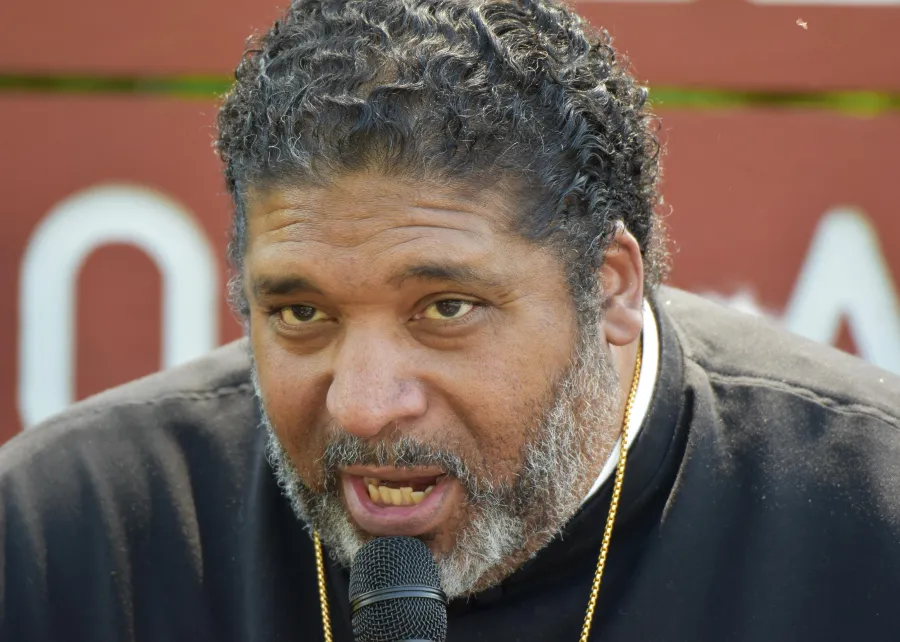Rev. William Barber: 'Unions are tremendous.'

By BERRY CRAIG
AFT Local 1360
The Rev. Dr. William Barber II says unions and the Poor People’s Campaign are natural allies.
The Rev. Dr. Martin Luther King Jr. agreed, he added. “Dr. King said that the union movement and poor people all had to come together,” said Barber, co-chair of the Poor People’s Campaign: A National Call for Moral Revival, in an interview with the Kentucky State AFL-CIO. "Unions have been tremendous."
He named the two-year-old movement for King’s Poor People’s Campaign.
Barber and the Rev. Dr. Liz Theoharis, campaign co-chair, brought the movement's interstate Emergency Truth and Poverty Bus Tour to Kentuckyon Monday. The bus stopped outside Eddyville penitentiary and at historically African American churches in Hopkinsville and Bowling Green.
“When we talk about poverty, we’re talking about extreme poverty but also about the working poor,” Barber said. “Fifty-eight million people work every day for less than a living wage.
“We don't have a living wage law in this country. That’s a union issue. If the minimum wage had kept pace with inflation and growth, it would be over $20 an hour.”
Barber cited the Fight for $15 movement, which started in 2012 when 200 New York City fast-food workers walked off the job, demanding $15 hourly pay and the right to unionize.
“We’re fighting for 15 and a union, but then they want to give us 15 and a union 10 years down the road, and it's already almost obsolete today,” Barber said.
“So to be in the in the union movement and to be aligned with the Poor People’s Campaign is one and the same.”
King proposed a Poor People's Campaign in May, 1967, declaring, "I think it is necessary for us to realize that we have moved from the era of civil rights to the era of human rights…[W]hen we see that there must be a radical redistribution of economic and political power, then we see that for the last twelve years we have been in a reform movement…That after Selma and the Voting Rights Bill, we moved into a new era, which must be an era of revolution…In short, we have moved into an era where we are called upon to raise certain basic questions about the whole society."
In December, 1967, he called for a poor people’s march on Washington. But he was assassinated in April, 1968.
In 2013, Barber, president of the North Carolina NAACP, became known nationally for leading peaceful “Moral Monday” protests in Raleigh, the state capital.
In 2017, he resigned as NAACP head to found the “Poor People’s Campaign: A National Call for Moral Revival.”
Barber came to Frankfort, Kentucky's capital, last year. At the Capitol, he led protests against racial and economic injustice; union members were in the crowd.
King led a civil rights march to the Capitol in 1964. Union members were in the march, estimated at 10,000 strong.
Several hundred people, including union members, retraced King's steps on April 4, 2018, the 50th anniversary of his murder.
The "MLK March to Move" was organized by The People’s Campaign, a grassroots group which aims to persuade "middle class, working class and economically struggling people to participate with a purpose and vote in their own best interests," to reinforce "the work of social justice organizations in the political realm" and to foster "moral progressivism."
AFSCME Indiana-Kentucky Council 962 helped host the march. Union members joined the procession and union officials were in the speaker's lineup on the Capitol steps, where King stood and spoke.
King often praised unions.
"As I have said many times, and believe with all my heart, the coalition that can have the greatest impact in the struggle for human dignity here in America is that of the Negro and the forces of labor, because their fortunes are so closely intertwined,” he said.
Dr. King warned that enemies of racial justice were also enemies of unions: “The labor-hater and labor-baiter is virtually always a twin-headed creature spewing anti-Negro epithets from one mouth, and anti-labor propaganda from the other mouth.”
He denounced “right to work” laws as a scam: “In our glorious fight for civil rights, we must guard against being fooled by false slogans, such as ‘right to work.’ It is a law to rob us of our civil rights and job rights.
“Its purpose is to destroy labor unions and the freedom of collective bargaining by which unions have improved wages and working conditions of everyone…Wherever these laws have been passed, wages are lower, job opportunities are fewer and there are no civil rights. We do not intend to let them do this to us. We demand this fraud be stopped. Our weapon is our vote.”